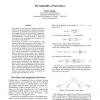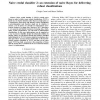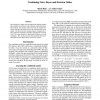101
Voted
FLAIRS
2006
15 years 1 months ago
2006
In this paper, we introduce a new restricted Bayesian network classifier that extends naive Bayes by relaxing the conditional independence assumptions, and show that it is partly ...
FLAIRS
2004
15 years 1 months ago
2004
Naive Bayes is one of the most efficient and effective inductive learning algorithms for machine learning and data mining. Its competitive performance in classification is surpris...
101
click to vote
DMIN
2008
15 years 2 months ago
2008
Naive credal classifier 2 (NCC2) extends naive Bayes in order to deliver more robust classifications. NCC2 is based on a set of prior densities rather than on a single prior; as a ...
98
Voted
FLAIRS
2008
15 years 2 months ago
2008
We investigate a simple semi-naive Bayesian ranking method that combines naive Bayes with induction of decision tables. Naive Bayes and decision tables can both be trained efficie...
106
Voted
ECML
2004
Springer
15 years 4 months ago
2004
Springer
It is well-known that naive Bayes performs surprisingly well in classification, but its probability estimation is poor. In many applications, however, a ranking based on class prob...
121
Voted
CEAS
2006
Springer
15 years 4 months ago
2006
Springer
Naive Bayes is very popular in commercial and open-source anti-spam e-mail filters. There are, however, several forms of Naive Bayes, something the anti-spam literature does not a...
DIS
2004
Springer
15 years 4 months ago
2004
Springer
Bayesian classifiers such as Naive Bayes or Tree Augmented Naive Bayes (TAN) have shown excellent performance given their simplicity and heavy underlying independence assumptions....
ECML
2007
Springer
15 years 4 months ago
2007
Springer
Class binarizations are effective methods for improving weak learners by decomposing multi-class problems into several two-class problems. This paper analyzes how these methods can...
BIBE
2007
IEEE
15 years 4 months ago
2007
IEEE
Recent research has demonstrated the utility of using supervised classification systems for automatic identification of low quality microarray data. However, this approach requires...
110
click to vote
PKDD
2001
Springer
15 years 5 months ago
2001
Springer
In some domains, Information Extraction (IE) from texts requires syntactic and semantic parsing. This analysis is computationally expensive and IE is potentially noisy if it applie...



